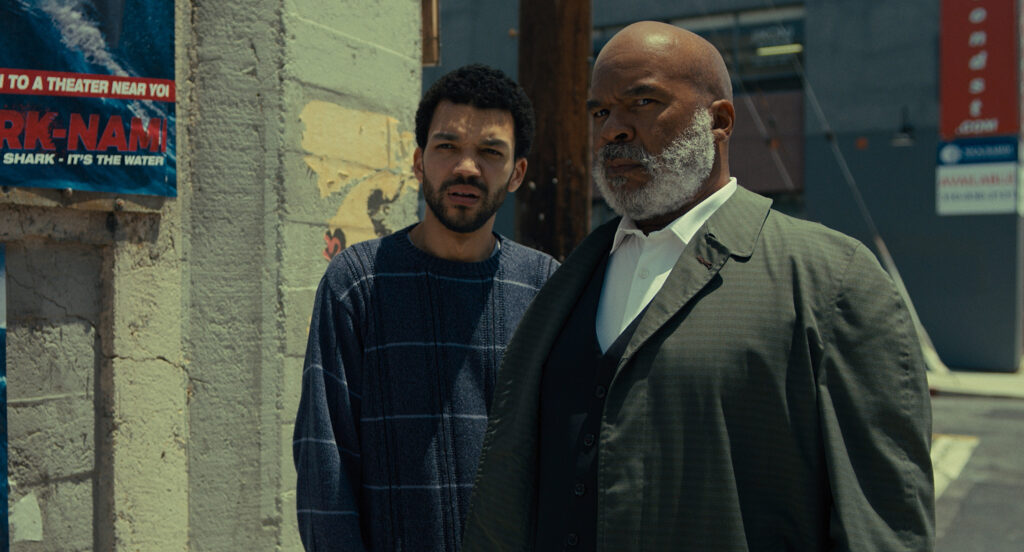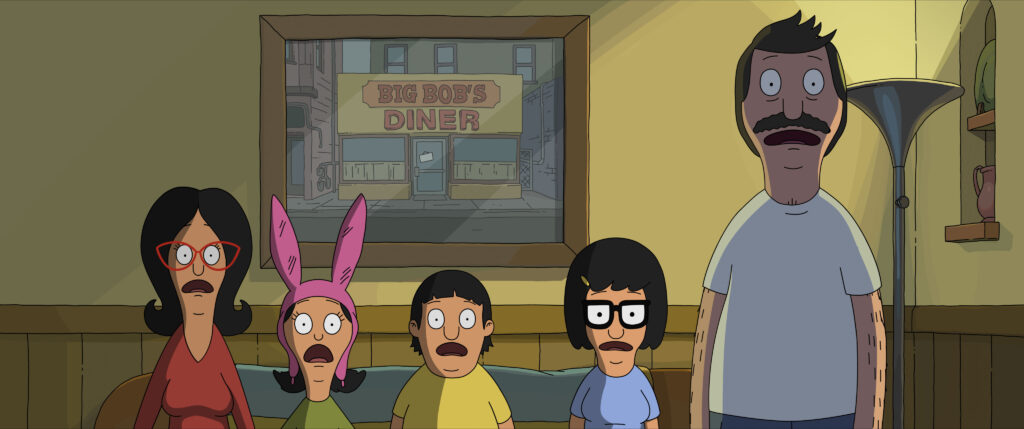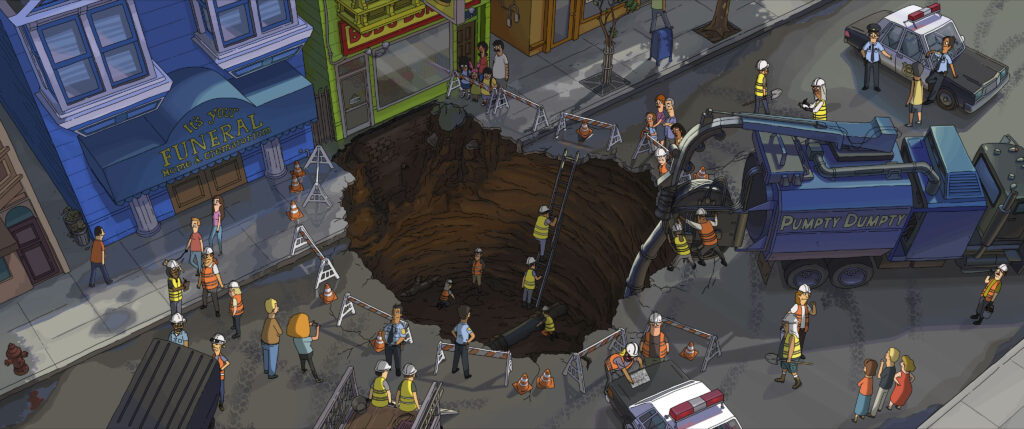March 16, 2024
by Carla Hay

“The American Society of Magical Negroes”
Directed by Kobi Libii
Culture Representation: Taking place in Los Angeles (and briefly in New York City), the comedy/drama film “The American Society of Magical Negroes” features a racially diverse cast of characters (African American, white and a few Asian and Latin people) representing the working-class, middle-class and wealthy.
Culture Clash: A struggling artist is recruited to work for the secretive American Society of Magical Negroes, whose purpose is to make white people comfortable, in order to prevent black people from getting harassed and killed.
Culture Audience: “The American Society of Magical Negroes” will appeal primarily to people who don’t mind watching inept and boring racial satires.

“The American Society of Magical Negroes” could have been a clever and incisive comedy/drama about how racial stereotypes on screen can affect people in real life. Unfortunately, this dull and mishandled racial satire has bland characters, a weak story and stale jokes that repeatedly miss the mark. This terrible misfire also fails at spoofing romantic comedies.
Writer/director Kobi Libii makes his feature-film debut with “The American Society of Magical Negroes,” which had its world premiere at the 2024 Sundance Film Festival. “The American Society of Magical Negroes” squanders the talent of its impressive cast by putting them in a movie that is as timid and insecure as its lead character. A movie poking fun at racial stereotypes needs to be bold and self-assured in what it has to say, instead of lazily filling up the story with derivative and unfunny scenes that have nothing interesting to say. Many of the movie’s cast members who are supposed to have chemistry with each other don’t have any believable chemistry, resulting in too many awkwardly acted scenes. That’s mostly the fault of the director and anyone else who made the casting decisions.
In “The American Society of Magical Negroes,” Aren Mbado (played by Justice Smith) is a 27-year-old struggling artist who is based in Los Angeles. Aren’s specialty is making sculptures out of yarn. The movie’s first scene shows Aren at an art gallery exhibiting his work. At this gallery event, there are hardly any buyers. The spectators don’t seem to understand Aren’s art. It doesn’t help that constantly stammering Aren has trouble articulating to people what his art is all about.
Aren (who is African American) experiences a racial microaggression when a white male attendee (played by James Welch) mistakenly assumes that Aren is a waiter, not the artist whose art is on display. Gallery owner Andrea (played by Gillian Vigman) notices this insult and tells Aren, “If you don’t stick up for your art, I can’t do it for you.” Because the exhibit is a sales flop, Andrea also threatens to cancel Aren’s exhibit before the end of its scheduled run. Aren begs Andrea not to cancel because he says he spent more than $3,000 on yarn and can’t afford any more.
This isn’t how Aren (who is a graduate of the prestigious Rhode Island School of Design) thought his life would turn out to be. Aren is nearly broke, and he has no other job prospects. He doesn’t want to do work that doesn’t involve his artistic skills. Someone who is quietly observing Aren at the gallery is a bartender, who is also African American. The bartender will eventually introduce himself to Aren and reveal why he has been watching Aren.
After leaving the event, Aren goes to an outdoor ATM in a dark alley and sees he only has $17.31 in his bank account, which is below the minimum ATM withdrawal of $20. A young white woman named Lacey (played by Mia Ford) walks up to the ATM to make a transaction, but she’s having trouble using her ATM card. She asks Aren to help her. It turns into a very clumsily written scene of Lacey loudly accusing Aren of trying to steal her ATM card.
Just at that moment, two young white men named Brad (played by Eric Lutz) and Ryan (played by Kees DeVos) happen to be walking by and they come to the “rescue” of Lacey, as Aren vehemently denies that he was doing anything wrong. It’s supposed to be the movie’s way of showing a “Karen” incident, where a white woman wrongfully accuses a person of color (usually someone black) of a crime, and the white woman is automatically believed.
Just as it looks like there might be an altercation and police might be called, someone comes to Aren’s rescue: the bartender from the gallery event. He had been secretly following Aren and now is able to smooth-talk Lacey, Brad and Ryan, by showing them it was all a misunderstanding. As a way to placate them, this mysterious stranger starts talking about how great the neighborhood is and recommends that they go to his favorite barbecue restaurant nearby. Lacey, Brad and Ryan then amicably leave.
Aren thanks the stranger, who then reveals who he is and why he is there. He says his name is Roger (played by David Alan Grier), and he is a recruiter for the American Society of Magical Negroes, a secret group of black people whose purpose is to make white people comfortable and less likely to cause harm to black people. As Roger says to Aren, the “most dangerous animal” on Earth is “a white person who is uncomfortable,” especially around black people. Roger also says that “officially,” the society is a “client services industry.” But “unofficially, we’re saving the damn world.”
Roger tells Aren that Aren seems to have the qualities to be an ideal member of the American Society of Magical Negroes. Aren has to go through a vetting process first. Aren is very skeptical about what Roger is saying, until Roger teleports them to the headquarters of the American Society of Magical Negroes, which looks a lot like an African American version of the Hogwarts School of Witchcraft and Wizardry from the “Harry Potter” book/movie series.
In real life, the term “magical Negro” was invented by filmmaker Spike Lee as a way to describe a black character whose main purpose is to help and uplift the central white character in a story. This “magical Negro” usually has extraordinary abilities that are implemented to make the white protagonist’s life better. Some examples include the characters played by Will Smith in 2000’s “The Legend of Bagger Vance” and 2005’s “Hitch”; Whoopi Goldberg in 1990’s “Ghost”; and Michael Clarke Duncan in 1999’s “The Green Mile.”
At the American Society of Magical Negroes, the recruits are told that their white clients don’t know and aren’t supposed to know that they are clients. The recruits are taught what a “magical Negro” is supposed to do and are shown hologram-like examples, which are usually not-very-funny scenes of black men being subservient and fawning to white men. Oddly, and with no explanation, the movie has multiple scenes of black men grabbing white men’s crotches in these “magical Negro” scenes. There’s also a magical amulet that is used to gauge the level of “white tears” that a white person has, in order to determine how likely the white person will cause a racist incident that will make the white person look sympathetic.
The main teacher for these classes is a stern instructor named Gabbard (played by Aisha Hinds), while the society’s president is a wizard-like character named Dede Booker (played by Nicole Byer), who looks and acts like a low-rent fortune teller. Gabbard says of white people: “The happier they are, the safer we are.” Roger tells Aren: “White discomfort is your nemesis.” The number-one rule for the American Society of Magical Negroes is to keep the client happy.
One of the reasons why “The American Society of Magical Negroes” is so poorly written is that it never really shows why Aren is an ideal candidate for this group. The opening scene at the gallery is supposed to be the movie’s questionable “proof” that Aren would be perfect for this “magical Negro” job. But all the scene really shows is that Aren is a sad sack who’s terrible at selling his art. Nothing about Aren’s family background or social life is shown or explained, except a brief mention that his father is black and his mother is white.
The recruits for “The American Society of Magical Negroes” are told that if at any time, they show negative emotions to the white people who are assigned to them, then they will be expelled from the society and lose their magical powers. It’s supposed to mean that these expelled people will be more vulnerable to getting racist harm from white people. Dede tells the recruits that black people who aren’t part of the American Society of Magical Negroes will have a shorter life expectancy. It’s a faulty concept from the start, because racist harm can happen under a variety of circumstances, no matter how nice people are to the racists who want to harm them.
During a break from these training sessions, Aren goes to a coffee shop, where he accidently bumps into a woman in her 20s, and her coffee spills all over her clothes. They exchange banter in a “meet cute” conversation, where Aren tries to deny that he’s flirting with her, and they both try to act like they aren’t immediately attracted to each other, even though it’s obvious that they are. And then, Aren suddenly leaves without getting her name. You know where all of this is going, of course.
Aren needs the money that this “magical Negro” job is offering, so he agrees to be part of the tryout process, with Roger as Aren’s wryly observing mentor. One of these tests involves (not surprisingly) a white male cop named Officer Miller (played by Tim Baltz), who feels easily threatened in the presence of black men. It leads to some moronic, time-wasting scenes where Officer Miller needs help with masculine confidence, including being able to gain entrance into an exclusive, trendy nightclub.
When Aren passes the necessary tests, he becomes an official member of the Society of Magical Negroes. Aren is then assigned his first client: a design engineer named Jason (played by Drew Tarver) at a social media company called Meetbox, which is obviously a parody of Facebook. Aren magically gets a job at Meetbox as a graphic designer who happens to have his desk workspace right next to Jason’s desk workspace.
Almost everyone at Meetbox doesn’t seem like a real person but is portrayed in the movie as a stereotype. Jason is a tech dweeb with mediocre talent and almost no charisma, but the movie makes several un-subtle points that Jason is perceived as better than he really is, just because Jason is a white male. Jason has an attractive co-worker named Lizzie (played by An-Li Bogan), who just happens to be the same woman who met Aren at the coffee shop. More awkward conversations ensue.
The founder/CEO of Meetbox is an egotistical Brit named Mick (played by Rupert Friend), while the immediate supervisor of Lizzie, Jason and Aren is prickly Linda Masterson (played by Michaela Watkins), who cares more about being a sycophant to Mick than being a good boss. Meetbox gets embroiled in a racial scandal when people in Ghana get rejected from joining Meetbox because Meetbox’s facial recognition technology gives preference to white people. The movie never explains why only Ghana has this problem, as if black people only live in Ghana.
Several situations occur that show how Jason is unaware of how his white male privilege gives him advantages. Jason feels entitled to being thought of as superior to a more talented co-worker such as Lizzie, who wants the same job promotion that Jason wants. The movie shows that Linda is part of the problem too, since she uses coded terms such as Jason is a “better fit” than Lizzie to give an important presentation for an idea that came from Lizzie. Jason has no qualms about being unfairly chosen to lead this presentation.
Not surprisingly, Jason shows a romantic interest in Lizzie. Much of the movie is about a love triangle where “magical Negro” Aren isn’t supposed to let Jason know that he’s also interested in dating Lizzie. It all becomes so tiresome and tedious, because a lot of the movie’s dialogue and scenarios have no wit or charm.
Lizzie’s racial identity is not mentioned in the movie, except for Jason calling Lizzie “ethnic.” However, actress Bogan’s ethnicity in the movie’s production notes is described as Taiwanese/Irish. If “The American Society of Magical Negroes” really wanted to have more edge to its limp satire, it would’ve made the Lizzie character unambiguously white, in order to increase the racial tension between Aren and Jason.
It should come as no surprise that “The American Society of Magical Negroes” makes Jason a racist who doesn’t think that he’s racist. You can do a countdown to the “big racial confrontation” scene where someone goes on a rant about racism, as white people in the room get uncomfortable and try to deny racism. This scene falls flat, because Aren still ends up being sheepish and apologetic.
“The American Society of Magical Negroes” then goes off the rails into fantasy with teleporting scenes, as it seems to forget all about the movie’s original concept, and then takes a silly detour into wrapping up the conflicts over the love triangle. The performances in the movie aren’t terrible, but they aren’t impressive either, mainly because the writing and directing are so substandard. A “twist” at the end is an underwhelming commentary on sexist stereotypes. “The American Society of Magical Negroes” wants to tell some hard truths about racism, but the movie’s approach is woefully inadequate and lacking in credibility.
Focus Features released “The American Society of Magical Negroes” in U.S. cinemas on March 15, 2024.


